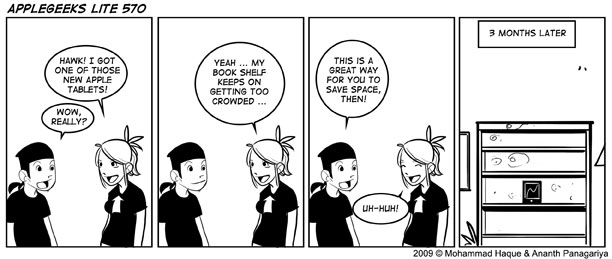‘We will pay the price, but we will not count the cost…”
arts and leisure, comics and animation, everyday glory, food for thought, geekery, movies and TV, news and info, office antics, science and technology, Whiskey Tango Foxtrot...?! January 29th, 2010Friday – 29 January 2010
TGIF and all that goes with that.
Last night, SaraRules and I attended two more movies at the Sundance Film Festival: Abel and Russian Lessons. Both movies were very good.
Abel told the story of a young boy in Mexico named, aptly enough: Abel (pronounced “AH-bel,” not “AY-bel”). From the Sundance film synopsis:
Adorable little Abel has problems in the head. His mother collects him from the psychiatric ward hoping not to upset him. She carefully discusses with his teacher how to deal with the absence of Abel’s father. The entire family is on pins and needles, worrying about Abel breaking down. But things take an interesting turn when the little boy emphatically carves out a new role for himself in the family—he decides to become the father of the house. Abel transforms the fear his family has about his episodes into the respect due to the head of the household. Oddly enough, it works! That is, until a stranger shows up at the breakfast table, claiming to be Abel’s father.
To simply say that this movie was… “quirky” would not quite do it justice. It was offbeat, yet still quite endearing. Watching the family, it was easy to spot dysfunctions in their relationships… but viewers were quickly drawn in by the naturalness of the characters’ interactions – they could have been any family. Or every family. Even yours. Or mine.
In a rather unexpected move, this movie also employed silence as a way to define a certain moment in time, similarly to the way it was used in Contact or Akira Kurosawa’s Dreams, or even the initial battle scene in J.J. Abrams’ Star Trek. And, as with each of those movies, along with the on-screen imagery, it was a very powerful use of a (lack of) sensory input.
I hope that this film finds its way to mass distribution. It certainly deserves it.
![]()
![]()
![]()
![]()
![]()
![]()
![]()
![]()
![]()
Russian Lessons was a documentary about the civil war between Russia and the former Soviet republic of Georgia.
Andrei Nekrasov, with directing partner Olga Konskaya, returns to Sundance with a formidable documentary that energetically delves into the violent and bewildering conflicts in the Caucasus, with Russia pitted against the former Soviet state of Georgia, and involving Georgia’s troubled regions of South Ossetia and Abkhazia. Boldly visiting conflict zones rarely filmed, the codirectors uncover damning evidence of Russian violence, incidents whose few recorded images are often reprocessed in mass-media reports as evidence of other people’s crimes (often, supposedly, residents of Georgia).
The movie’s director, Andrei Nekrasov, spoke briefly before the film started. He called it “…a movie of sacrifice and hope.” SaraRules and I noted later that we both thought of Freedom Riders in the same light. Mr. Nekrasov went on to say that we “…can’t be happy without being aware that there is suffering in the world, but that we can change it through sympathy, empathy and love.” Something to note: Mr. Nekrasov is Russian, not Georgian. Yet, you could see that he struggled to make sense of how and why anyone – let alone his own countrymen – could rain down such atrocities and suffering upon people so unapologetically.
The movie, while a fine documentary, was not always easy to watch. Nor, would I imagine, was it easy to film. The interviews showed the raw emotion of the people on both sides of the war. Mr. Nekrasov and Ms. Konskaya also did not pull any punches in showing the aftermath of the Russian assaults on the Georgian people – including an airstrike against a civilian apartment complex that occurred while Mr. Nekrasov was driving into that city.
This is yet another movie that I think deserves wide distribution. It is a movie that everyone should see… although it might be one of those movies that people only need to see once.
![]()
![]()
![]()
![]()
![]()
![]()
![]()
![]()
![]()
Stray Toasters
- Is it a bad sign that I’m tempted to get a few of these and hand them out to people at work?
- JD Salinger, author of Catcher in the Rye, dies at 91
Matt Salinger, best/worst known for portraying Captain America in the 1990 movie, was the son of JD Salinger. - Borders Group Lays Off 10% of Corporate Staff
- And now, MILESTONE FOREVER
- This might fall under both the “Whiskey Tango Foxtrot…?!” and “Too Much Free Time” headers:
- And I’ve been putting out fire
With gasoline.. - While not perfect, I contend that the iPad is an interesting “middle child” in Apple’s portable technology family.
- …in a related note: Apple Change Quietly Makes iPhone, iPad into Web Phones

- For some reason, my ICQ account has decided that my password – the same one I’ve had for… over ten years – isn’t the one it wants. Oh, well.
- Tesco store bans shopping in pajamas
- An added plus to Supergirl #50: Helen Slater, Jake Black and Cliff Chiang
- Underwater Sculpture by Jason de Caires Taylor
Namaste.
Leave a Reply
You must be logged in to post a comment.
